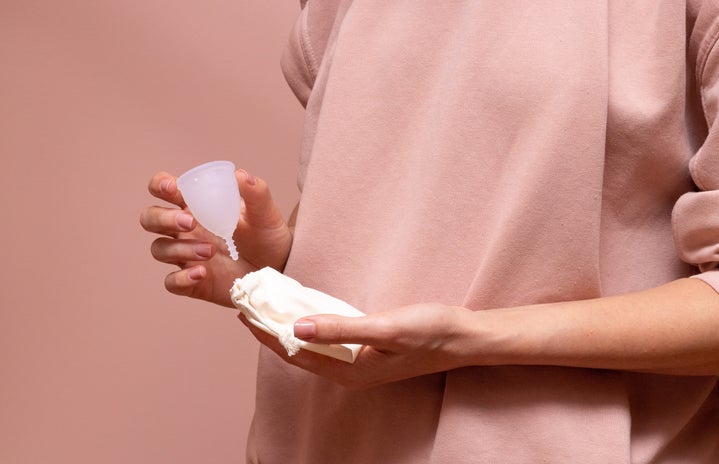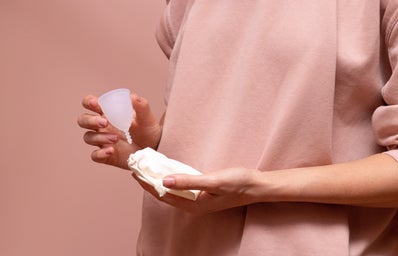At the beginning of the year, the supermarket company Asda changed the signage in its stores from “Feminine Hygiene” to “Period Products”, whipping up a bit of a storm online. I was delighted to see that many shared my sentiment of support for this move and there was also an outpouring of praise for the company.
However, there was also – sadly, but unsurprisingly – plenty of criticism. I think many people simply don’t grasp the implication of the words ‘feminine hygiene’. People often feel threatened by their confusion, which turns into anger, and, in this case, exploded out into the internet in the form of ranting tweets… It’s nothing new.
As much as I don’t want to get caught up in an ugly Twitter brawl, I wish I could explain to people that this change is in fact important. It has to do with far more than which words we prefer the sound of. It regards a much larger issue – the shifting of attitudes away from the culture of shame that surrounds menstruation.
I’ve spent years stealthily sneaking off to the bathroom with a pad hidden up my sleeve or feeling the heat of embarrassment on my face when I realise what I’ve pulled out from my pocket is not in fact my lip balm, but a tampon. To really think of it, who am I even hiding it from? And why?
Much of the shame around periods is rooted in the idea that they are ‘dirty’. The term ‘feminine hygiene products’ only exacerbates this by suggesting that periods are unhygienic. The responsibility for this problematic narrative lies largely on the shoulders of the companies that sell disposable period products. The advertising of these products is yet another example of the capitalist industry utilising shame as a marketing tool. In the past, menstrual products were usually homemade and reusable, but in the 1920s and 30s, disposable pads and tampons began to catch on as bandage companies, that were left with a surplus of supplies when World War I ended, decided to repurpose their materials. Rather than emphasising on the practicality of these cheap and time-saving products, they portrayed women on their periods as unclean and desperate. These adverts implied that it was mortifyingly embarrassing for anyone to know that you were bleeding by seeing your period products. What this also did was create a deep-rooted fear in women about leaking through to their clothings or smelling foul. Their own products were then obviously proposed as the answer to all these problems.
Even a hundred years later, periods are still often shrouded in this impenetrable layer of secrecy and fear. The vague way we talk about period products carry strong negative connotations that our attitudes cannot help but be shaped by. As Siena Dexter writes in her article, The Hygiene Myth, “Imagine if we called incontinence products ‘geriatric purification.’ If face wash was ‘facial de-grimer’. Or, if you purchased your baby products in the ‘infant defouler’ aisle. Nappies might as well be called sanitary pads too because what does a ‘sanitary pad’ mean anyway? It could just as easily be a rag with which to mop up kitchen spills, as it is an absorbent towel for your flow.”
She stresses how periods are in no way dirty or bad for your health, but a lack of education certainly is. A study done by the Indian Government found that 81% of girls in rural India used unsterilised cloths as sanitary towels. In fact, they often purposely used the dirtiest clothes available as periods are already seen as unclean. It is evident then that the stigma around periods (and the female reproductive system in general) can even threaten the physical health of people who menstruate.
However, the term ‘feminine hygiene products’ needs to be scrapped just as much for its problematic use of the word ‘feminine’. Not everyone who menstruates is a woman or a girl: they may be non-binary, transgender or any gender identity at all. It has nothing to do with periods! There are also women and girls (whether they be cis or trans) who don’t menstruate and this does not in any way make them less feminine.
Kenny Ethan Jones (model, activist and entrepreneur) writes about the language surrounding periods from his perspective as a transgender man and uses his platform to illuminate issues that need to form a larger part of the discussion. He explains that “When we solely use she to describe people that experience periods, we by default exclude everyone who doesn’t identify as a woman from the conversation, and if we aren’t a part of the conversation we’re not thought of. Corporations don’t think of us, government bodies don’t think of us and before we know it we have a whole system created based on the needs of women, and nobody else.”
He also points out how “the majority of drop-off centres only provide period products to those who identify as women; Sanitary bins only exist in the women and disabled toilets, and baby changing facilities; All of the period underwear I’ve ever come across only have a feminine fit.” By strictly associating periods with women, we exclude other people who bleed from not only the discourse, but also from the resources and facilities that are vital for their wellbeing and health.
I think it’s also important to mention that Jones makes it very clear he doesn’t think that the language needs to be completely gender-free at all times when discussing periods. Some women find a strong tie between their periods and their sense of ‘womanhood’ and this personal experience is just as valid as any other. Adapting our language is intended to deny the experience of any individual, but to expand our understanding as well as think more carefully about the power of the words we use to construct narratives and attitudes.
The phrases we use often come from a history and marketing environment which simply did not have our best interests at heart. We need to start looking a little more critically at the messages they’re sending us because I’m done with hiding my tampons and it’s about bloody time we completely ditch the shame.
Words by: Olivia Burnett
Edited by: Harsheni Maniarasan


